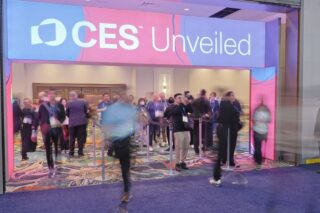Against the backdrop of an increasingly volatile international trade environment, more and more European citizens and businesses are questioning the dominance of US-based digital service providers – such as Google, Amazon, and ChatGPT. But for those seeking home-grown alternatives, what are the options?
Donald Trump’s return to the White House in January has seen international tensions flare, with a looming trade war threatening geopolitical stability. The escalating friction between global economic superpowers has prompted a reassessment of technological dependencies, with a growing number of European governments, citizens, and businesses questioning the dominance of US-based digital services in their day-to-day existence. Many believe that continued reliance on American tech giants weakens national expertise and digital sovereignty, and exposes them to a volatile trade environment.
From AI assistants to email providers and navigation apps, Europe has capable substitutes to the offerings of US tech giants, yet many of these are overshadowed by Silicon Valley’s heavyweight names. So for those looking to switch service providers, what are the alternatives, and how viable are they?
READ ALSO
Generative AI: Le Chat
Artificial intelligence has captivated global innovation discussions over the last decade, with American and Chinese tech powerhouses shaping much of the narrative. In this landscape, Mistral AI, a Paris-based start-up, has emerged as a nascent yet burgeoning contender, challenging the status quo with its advanced large language models and more-than-competent generative AI solutions. The company’s latest creation, Le Chat, aims to disrupt the chatbot space dominated by OpenAI’s ChatGPT, while forging a Europe-focused identity.
Built with a focus on speed, efficiency, and cultural intelligence, Le Chat has been optimized to resonate strongly with European users, while setting an industry gold standard for performance and cost efficiency. Capable of delivering 1,000 words per second – compared to ChatGPT’s 650 – it can deliver complex responses faster, saving users valuable time in high-stakes industries such as finance and legal services. It is also significantly cheaper than ChatGPT and is fluent in French, English, German, Spanish, and Italian.
Email Platform: Proton Mail
Google’s Gmail was first released in 2004 and has grown to become the most popular email platform, with billions of personal and business users around the world. However, it is no longer the only major player when it comes to free email for private and business use. While Gmail is easy to use and offers a wide range of useful features, there are safer alternatives available.
Offered by Geneva-based technology company Proton AG, Proton Mail is encrypted email from Switzerland. It is becoming increasingly popular, as users prioritize secure and private email communication. A key selling point for Proton Mail is its security features; they use end-to-end encryption, which means only the intended email recipient is able to decrypt and view messages. In addition, you can sign up anonymously.
Whereas Gmail offers optional Gemini integration – where you can summon the AI assistant to find a specific email or attachment and use it to draft engaging emails on the go – the Proton Scribe writing assistant is a part of the subscription package and there is no need to pay for it separately (it costs $20 per month to unlock Gemini in all Google Workspace apps, including Gmail).
Web Browser: Opera
Developed by Oslo-headquartered technology company Opera, Opera Browser is a beautifully designed web browser with a Red Dot Award for its stunning user interface. While Google’s Chrome is known for its speed and integration with Google services, Opera stands out with unique features such as a built-in VPN, ad blocker, and crypto wallet. It is compatible with Windows, macOS, Linux, Android, and iOS.
Compared to Chrome, which tends to consume more system resources – especially when multiple tabs are open – Opera’s lightweight design makes it an excellent choice for older devices or slower internet connections. It also includes Turbo Mode, which compresses web pages, improving speed on slower networks and ensuring smooth page load times. Opera also follows GDPR regulations, offering a high level of data protection and regular security audits, while its no-log policy ensures that user data is not stored or sold to third parties.
By contrast, Chrome collects browsing data for its services, which may raise privacy concerns for some users.
3D Modeling Software: SolidWorks
Choosing the right 3D modeling software for your business can be challenging. Two leading contenders are Solidworks, which is offered by French company Dassault Systèmes, and Fusion 360, from US-based company Autodesk. Both can help with a vizualisation, simulation, prototyping, and production. SolidWorks, in particular, is known for its robustness in mechanical design and engineering, particularly for complex assemblies and detailed manufacturing drawings, and is more popular in industries such as automotive, aerospace, and consumer products.
Industrial Automation: Schneider Electric
When it comes to industrial automation, choosing the right Programmable Logic Controller (PLC) can make a significant difference in efficiency, reliability, and cost-effectiveness. Two of the most prominent names in the PLC market are Allen-Bradley (by US-based company Rockwell Automation) and French company Schneider Electric.
With its energy-efficient solutions and IoT integration, Schneider Electric’s offerings – particularly its Modicon range – are an ideal choice for industries focused on sustainability and energy management, with the potential to generate significant long-term savings. The M580 series, for example, offers excellent scalability and real-time data processing for IoT-enabled operations.
Schneider also offers a broader price range than Allen-Bradley, starting at around €350 for an entry-level Modicon M221 controller.
Video Conferencing Platform: Glowbl
Founded in 2011, Lyons-based Glowbl is a French company specializing in remote working solutions, with an online video conferencing platform designed to simplify, coordinate, and manage hybrid work. Unlike traditional video conferencing tools such as US-based Zoom, Glowbl enables participants to collaborate in a virtual space, interact with shared content, and engage in discussions using intuitive features such as virtual whiteboards, file sharing, and live chat.
Glowbl supports high-quality video and audio calls, with advanced features such as screen sharing, real-time annotations, and breakout rooms to facilitate smaller group discussions. Moreover, the platform’s virtual meeting rooms are customisable, allowing companies to create branded environments that match their corporate identity. Glowbl’s unique focus on collaboration and engagement makes it ideal for remote teams, educators, and businesses looking to host interactive webinars, training sessions, and virtual conferences.











